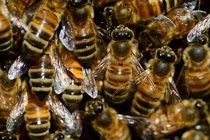
A new study shows how a bee’s exposure to pesticides can cause significant changes in its scent memory abilities. The chemical formulations that kill mites may be non-lethal but can still harm bee populations.
Findings reported in the January issue of Environmental Toxicology and Chemistry found that bees exposed to a pesticide used to exterminate mites within honey bee hives have changes in their behavior. They also found that these changes could be related to the expression levels of genes that encode key proteins in the brains of bees. In particular, three genes essential for scent memory were changed after pesticide exposure. Researchers from the University of Toulouse and the Jean-François Champollion University in France conducted exposure experiments with Western honey bees. Bees were exposed to the mite-killing pesticide Apilife Var for 11 months, and gene expression levels were compared to levels in the brains of unexposed bees. The study also evaluated if pesticides changed the way bees responded to scents. Apilife Var is a pesticide that kills mites and is made of natural extracts such as thyme, menthol and eucalyptus. These pesticides are effective against bee mites and are also known to affect cognition in mammals. Studies show that thyme extracts help rats complete maze tests and menthol can improve memory in rats. The protein expression levels of bees from this experiment showed seasonal differences during winter months. Three proteins decreased in bees who were exposed to pesticides 2-3 months after the start of the treatment. The proteins include transient receptor potential–like (TRPL), resistance to dieldrin (RDL), and Apis mellifera octopamine receptor 1 (AmOA1). In bees and other insects, TRPL helps bees avoid harmful chemicals. In theory, changes in the amount of this protein could cause confusion on whether a chemical is toxic or not. This could potentially cause bees to engage in unnatural behaviors, such as seeking out environments with harmful chemicals. The other two proteins studied are RDL, a neurotransmitter receptor and a neurotransmitter receptor that is crucial for learning. The study also found that chronic treatment with pesticides changed the way bees responded to scents. Exposed bees were more likely to respond to a scent that they were conditioned to associate with food. These bees were also more likely to remember that the scent was related to food after conditioning treatments. These findings provide additional understanding of how the pesticides can impact honey bees. Other studies have shown how these chemicals can hamper behaviors like learning, foraging, and scent memory. The genes studied in this paper are found in the octopamine pathway and includes proteins related to scent memory, sugar responses, and labor division. High octompamine levels are also correlated with bee anxiety. Long-term use of pesticides are associated with widespread honeybee population losses in Europe. A retrospective study showed that close to 10% of the honeybee population decline could be attributed to pesticide use. In 2002, new oilseed rape plants were introduced in the UK with seeds already coated in pesticides. Since the pesticide is water soluble, the plant takes up the chemical from its roots and the pesticide then circulates throughout the plants stems, leaves, and flowers. The coated seeds were a “key innovation” that avoids the need to regularly spray chemicals. However, the widespread use of the pesticide-covered rapeseed, and the exposure of bees to the pesticide while foraging, is now thought to be associated with bee population declines. Three pesticides from a class known as neonicotinoids were banned by the EU in 2013 because of their harmful impacts on bees. Farmers were concerned about the ban but there were no reported decreases in rapeseed oil yields in the UK after the ban. The use of these types of pesticides are still under review by the European Commission. |
Archives
August 2018
Categories
All
|
Addtext

 RSS Feed
RSS Feed